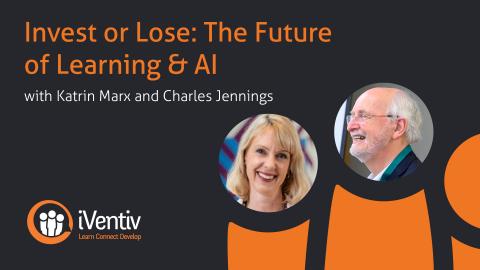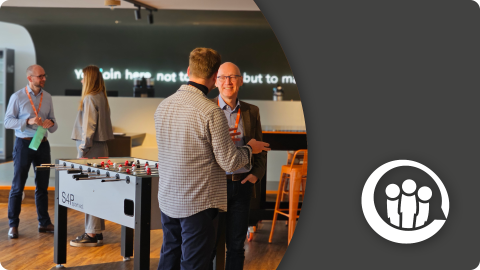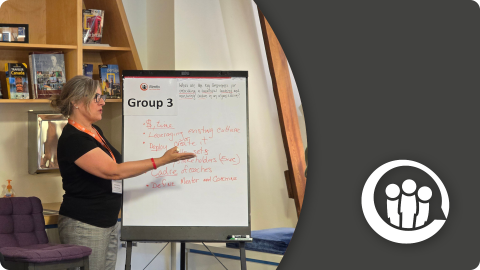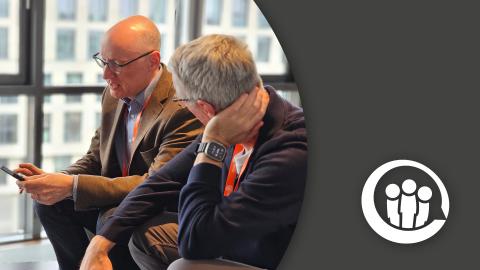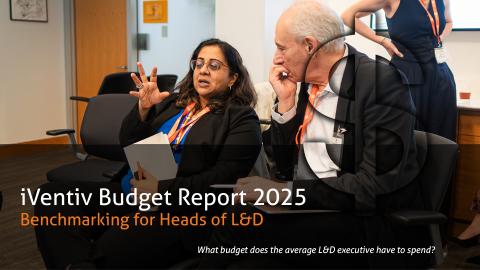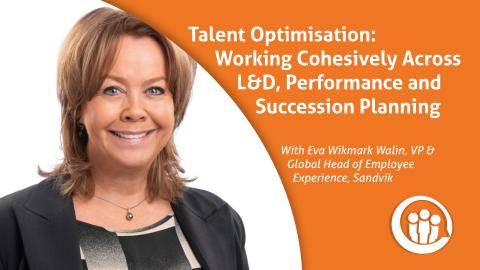In our recent interview with Trish Uhl, Senior AI Specialist, we explored the transformative potential of AI within the Learning & Development (L&D) functions of organisations. Trish, an expert in AI and technology, shared her insights on how AI is reshaping professional development and learning processes.
Trish's insights underscore the urgent need for L&D to catch up with technological advancements and leverage AI tools to remain relevant in a rapidly evolving digital landscape. The future of AI in L&D promises exciting possibilities, provided human creativity and critical thinking remain at the forefront of this transformation.
Join us as we deep-dive into Trish's expertise as a leader in AI, discuss it's implementation into the world of L&D, and ask the crucial question: is L&D too late to the game?
How do you think the Learning function is adapting to, and implementing, AI?
Trish tells us that the traditional role of gatekeepers in Learning & Development, who previously dictated the terms and access to professional development, is being challenged by the influx of new technologies. The world population is growing rapidly, and with it, the demand for immediate access to expertise and professional advice has increased, powered by advancements such as the internet, mobile technology, and AI.
Trish goes on to say that the pressure from technological advancements is transforming the concept of expertise itself, transitioning from a model where knowledge was exclusive to one where it is democratised. With generative AI, for example, she says that there is a significant shift towards providing real-time access to knowledge, enabling what is described as the "expertise and intelligence age" – an era characterised by the widespread use of AI tools, including low-code/no-code platforms that empower individuals to create applications without traditional coding expertise.
The role of critical thinking and its importance when it comes to AI implementation
Trish says that the adaptation to AI within learning is also fostering a new emphasis on critical thinking and the careful evaluation of information. The use of AI on personal devices for work-related tasks, often unbeknownst to employers, raises concerns about the need for critical engagement with technology and the information it produces.
She also highlights the importance of being judicious and selective with AI-generated content, stressing the necessity for critical thinking skills not only in professional settings but as a part of everyday technological interactions.
The conversation also touches on the broader implications of AI integration, such as automation bias—where there is an assumption that computer-generated solutions are inherently correct. This notion challenges individuals to question and verify AI outputs rigorously. Trish underscores the potential dangers of over-reliance on technology, suggesting that without critical examination, individuals might accept AI-generated solutions without sufficient scrutiny.
Overcoming challenges with AI integration organisation-wide
Automation bias, cybersecurity, phishing, deepfakes and AI fluency are the most critical points of reflection for all organisations looking to integrate AI, according to Trish.
She emphasises the importance of integrating AI into learning experiences and performance support systems, tailoring these technologies to human trigger points to enhance organisational functions. Addressing the challenges posed by AI, such as the rise of deepfakes and phishing schemes, Trish stresses the need for AI fluency—beyond mere literacy. AI fluency involves developing multiple skills to navigate various scenarios, including political manipulations and social engineering threats.
Trish’s key piece of advice?
Observe a continuous need for vigilance in managing AI tools, ensuring they are used to enhance human decision-making without replacing the critical thinking essential for ethical operations.
L&D – is it too late to the AI game?
Trish believes that Learning & Development is somewhat late in adapting to AI, largely due to the industry's insular nature and its tendency to benchmark only within itself, creating an echo chamber effect. This, she says, limits L&D from advancing as rapidly as other sectors that are incorporating external innovations and technologies more dynamically.
She goes on to say that this insularity poses an existential threat, particularly as consumer expectations shift due to technological advancements in other fields, such as online shopping and educational technologies. For instance, new partnerships and technologies introduced at events like Microsoft Build, such as the collaboration between Microsoft and Khan Academy and the introduction of AI tools like Khanmigo for educators, signal significant shifts in how educational content and experiences are delivered and consumed.
What do these developments outside of L&D highlight?
According to Trish, they underscore a pressing need for L&D to catch up and integrate these advanced AI tools to remain relevant. The potential of AI to transform traditional educational models and provide real-time, effective learning solutions that are increasingly necessary in a fast-evolving digital landscape are, according to Trish, gold dust for the L&D function.
Exciting times for AI and the future of L&D
When it comes to the future of AI and its integration into L&D, Trish tells us that we can expect great things, but only if critical thinking and human ingenuity remain intact and partner with this new tech.
She talks a little about her framework for integrating AI in Learning & Development, described as a crawl, walk, run, and fly, approach broken down as follows:
- Crawl phase: AI is used experimentally, like a toy
- Walk phase: involves applying AI to workflows, providing meaningful value as a tool
- Run phase: AI as an assistant, augmenting human performance
- The ultimate phase, flight: involves AI agents that are given goals, not tasks, and can independently plan, reason, and execute
This approach aims to create AI teams that work alongside humans, transforming workflows and business processes. Trish further emphasises the importance of human ingenuity and imagination, suggesting that while AI excels in intelligence benchmarks, human creativity and critical thinking remain crucial. The goal is to effectively communicate and partner with AI, leveraging both human and machine strengths.
Trish is both a technologist and trainer to her core, having spent more than two decades traveling around the world leading transformation projects - starting with computer automation and distance education in the 1990s; organizational change and IT Business Readiness in the early 2000s; public council, military and government advocacy paired with non-profit association and higher ed work to promote whole system change in addressing and closing the Skills Gap since 2004; to her focus now on Digital Transformation, developing resilient workers and fit for purpose workforces with skills, competencies and capabilities to translate cognitive computing and networked, cross-boundary teams into innovative, intelligent organisations that drive triple bottom line results for positive impact on people, planet and profits.
Frequently asked questions
How does AI change the role of traditional gatekeepers in Learning & Development?
AI is transforming the traditional role of gatekeepers in Learning & Development by democratising access to knowledge. Instead of a few individuals controlling the dissemination of expertise, AI tools enable real-time access to information, making professional development more accessible and efficient.
Why is critical thinking important when implementing AI in learning functions?
Critical thinking is essential because it ensures that AI-generated content is evaluated carefully. While AI can process and generate information quickly, human vigilance is necessary to verify the accuracy and relevance of this content, preventing over-reliance on technology and ensuring ethical use.
What challenges might organisations face when integrating AI into their learning functions?
Organisations may face several challenges, including automation bias, cybersecurity threats, phishing, and deepfakes. Additionally, there is a need for AI fluency, which involves understanding and navigating various AI applications and ensuring responsible, ethical use of AI technologies.
How can AI enhance human performance in Learning & Development?
AI can enhance human performance by acting as an assistant that augments human capabilities. For instance, AI can provide personalised learning experiences, automate routine tasks, and offer real-time feedback and support, allowing humans to focus on more complex and creative aspects of their work.
What is the significance of AI agents in the future of Learning & Development?
AI agents represent the most advanced phase of AI integration. Unlike AI tools that require specific instructions, AI agents are given goals and can independently plan, reason, and execute tasks. This capability allows them to work alongside humans as algorithmic teammates, transforming workflows and business processes.

